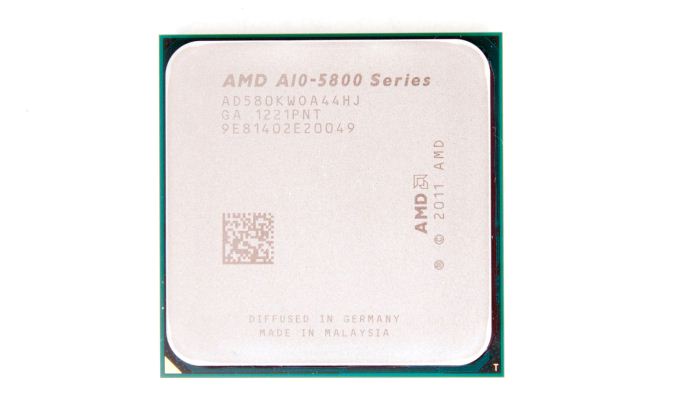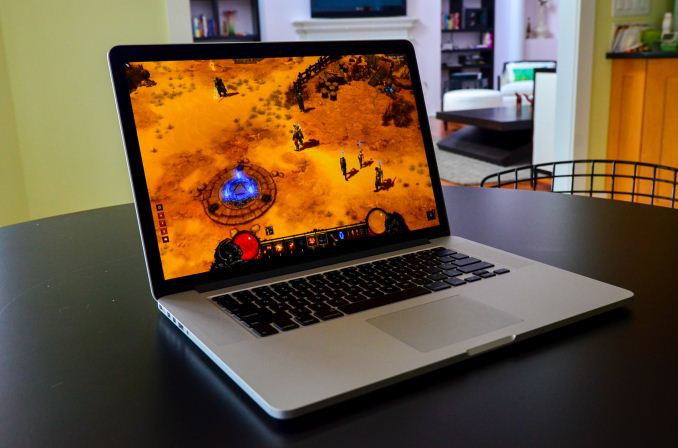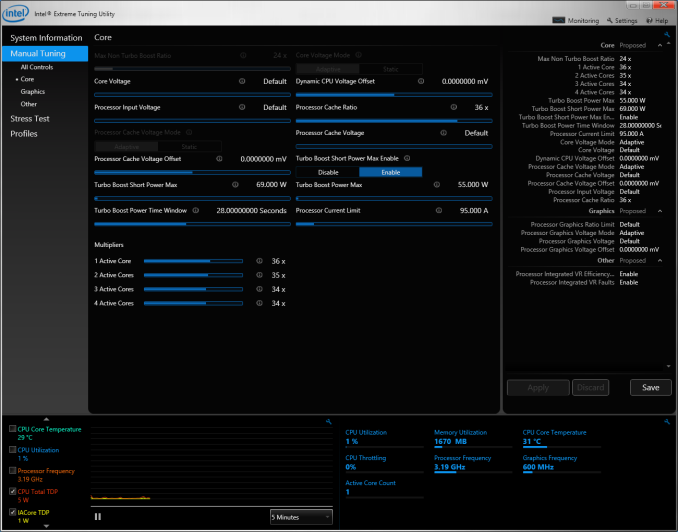Intel Iris Pro 5200 Graphics Review: Core i7-4950HQ Tested
by Anand Lal Shimpi on June 1, 2013 10:01 AM ESTThe Comparison Points
Intel sort of dropped this CRB off without anything to compare it to, so I scrambled over the past week looking for things to put Iris Pro’s performance in perspective. The obvious candidate was Apple’s 15-inch MacBook Pro with Retina Display. I expect its successor will use Iris Pro 5200, making this a perfect comparison point. The 15-inch rMBP is equipped with a GeForce GT 650M with a 900MHz core clock and a 5GHz memory datarate.
I also dusted off a GeForce GT 640 desktop card to shed a little more light on the 650M comparison. The 640 has a slightly higher core clock (925MHz) but it only has 1.7GHz DDR3, working out to be 27GB/s of memory bandwidth compared to 83GB/s for the 650M. Seeing how Iris Pro compares to the GT 640 and 650M will tell us just how good of a job Crystalwell is doing.
Next up is the desktop Core i7-4770K with HD 4600 graphics. This is a Haswell GT2 implementation, but at a much higher TDP than the 47W mobile part we’re comparing it to (84W). In a notebook you can expect a much bigger gap in performance between the HD 4600 and Iris Pro than what we’re showing here. Similarly I also included a 77W HD 4000 for a comparison to Ivy Bridge graphics.
On the AMD front I have the 35W A10-4600M (codename Trinity), featuring AMD’s 7660G processor graphics. I also included the 100W A10-5800 as a reference point since we were largely pleased with the GPU performance of Trinity on the desktop.
I listed TDPs with all of the parts I’m comparing here. In the case of the GT 640 I’m adding the TDP of the CPU (84W) and the GPU (65W). TDP is half of the story with Iris Pro, because the CPU, GPU and eDRAM all fit into the same 47W power envelope. With a discrete GPU, like the 650M, you end up with an extra 45W on top of the CPU’s TDP. In reality the host CPU won’t be running at anywhere near its 45W max in that case, so the power savings are likely not as great as you’d expect but they’ll still be present.
At the request of at least one very eager OEM, Intel is offering a higher-TDP configuration of the i7-4950HQ. Using Intel’s Extreme Tuning Utility (XTU) I was able to simulate this cTDP up configuration by increasing the sustained power limit to 55W, and moving the short term turbo power limit up to 69W. OEMs moving from a 2-chip CPU + GPU solution down to a single Iris Pro are encouraged to do the same as their existing thermal solutions should be more than adequate to cool a 55W part. I strongly suspect this is the configuration we’ll see in the next-generation 15-inch MacBook Pro with Retina Display.
To remove as many bottlenecks as possible I configured all integrated GPU options (other than Iris Pro 5200) with the fastest supported memory. That worked out to being DDR3-2133 on desktop Trinity and desktop IVB, and DDR3-2400 on desktop Haswell (HD 4600). The mobile platforms, including Iris Pro 5200, all used DDR3-1600.
On the software side I used NVIDIA's GeForce R320 v320.18, AMD's Catalyst 13.6 beta and Intel's 9.18.10.3177 drivers with Crystalwell support.













177 Comments
View All Comments
kyuu - Saturday, June 1, 2013 - link
It's probably habit coming from eluding censoring.maba - Saturday, June 1, 2013 - link
To be fair, there is only one data point (GFXBenchmark 2.7 T-Rex HD - 4X MSAA) where the 47W cTDP configuration is more than 40% slower than the tested GT 650M (rMBP15 90W).Actually we have the following [min, max, avg, median] for 47W (55W):
games: 61%, 106%, 78%, 75% (62%, 112%, 82%, 76%)
synth.: 55%, 122%, 95%, 94% (59%, 131%, 102%, 100%)
compute: 85%, 514%, 205%, 153% (86%, 522%, 210%, 159%)
overall: 55%, 514%, 101%, 85% (59%, 522%, 106%, 92%)
So typically around 75% for games with a considerably lower TDP - not that bad.
I do not know whether Intel claimed equal or better performance given a specific TDP or not. With the given 47W (55W) compared to a 650M it would indeed be a false claim.
But my point is, that with at least ~60% performance and typically ~75% it is admittedly much closer than you stated.
whyso - Saturday, June 1, 2013 - link
Note your average 650m is clocked lower than the 650m reviewed here.lmcd - Saturday, June 1, 2013 - link
If I recall correctly, the rMBP 650m was clocked as high as or slightly higher than the 660m (which was really confusing at the time).JarredWalton - Sunday, June 2, 2013 - link
Correct. GT 650M by default is usually 835MHz + Boost, with 4GHz RAM. The GTX 660M is 875MHz + Boost with 4GHz RAM. So the rMBP15 is a best-case for GT 650M. However, it's not usually a ton faster than the regular GT 650M -- benchmarks for the UX51VZ are available here:http://www.anandtech.com/bench/Product/814
tipoo - Sunday, June 2, 2013 - link
I think any extra power just went to the rMBP scaling operations.DickGumshoe - Sunday, June 2, 2013 - link
Do you know if the scaling algorithms are handled by the CPU or the GPU on the rMBP?The big thing I am wondering is that if Apple releases a higher-end model with the MQ CPU's, would the HD 4600 be enough to eliminate the UI lag currently present on the rMBP's HD 4000?
If it's done on the GPU, then having the HQ CPU's might actually get *better* UI performance than the MQ CPU's for the rMPB.
lmcd - Sunday, June 2, 2013 - link
No, because these benchmarks would change the default resolution, which as I understand is something the panel would compensate for?Wait, aren't these typically done while the laptop screen is off and an external display is used?
whyso - Sunday, June 2, 2013 - link
You got this wrong. 650m is 735/1000 + boost to 850/1000. 660m is 835/1250 boost to 950/1250.jasonelmore - Sunday, June 2, 2013 - link
worst mistake intel made was that demo with DIRT when it was side by side with a 650m laptop. That set people's expectations. and it falls short in the reviews and people are dogging it. If they would have just kept quite people would be praising them up and down right now.